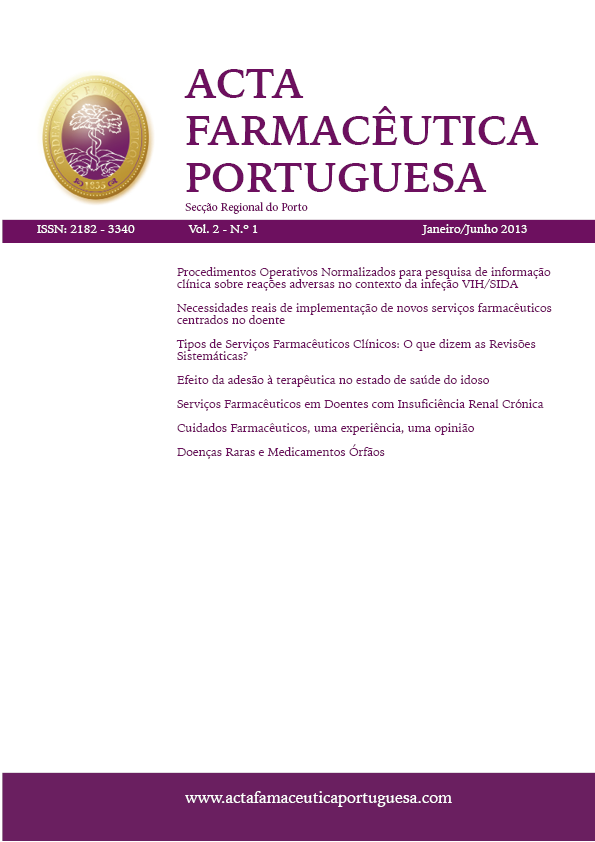Efeito da adesão à terapêutica no estado de saúde do idoso
Abstract
The prevalence of chronic diseases increases with age, and the constant growth of the overall population makes adherence to therapy a major challenge.
A solution to the problem of non-adherence to therapy prescribed by the physician population is the implementation, in community pharmacy, of stock monitoring and pharmacist intervention. We evaluated 54 elderly patients treated with at least 3 drugs with an autonomous life. Adherence to drugs prescription was observed by monitoring the patients, counting of medications not administered and historical progress of the lipid profile, blood glucose, blood pressure and cardiovascular risk in the beginning and end of the study.
The purpose of this study was achieved in general, since the pharmaceutical intervention contributed to the adherence to therapy, thereby reducing the impact of risk factors associated with cardiovascular disease, and contribute to the promotion of quality of life for the elderly patients.
References
World Health Organization. Active ageing: a policy Framework. Geneva. 2002; [Acedido a 08 de Fevereiro de 2011]. Disponível na Internet: http://whqlibdoc.who.int/hq/202/who_nmh_ nph_02.8.pdf
Instituto Nacional de Estatística. Dia internacional do idoso. 2005; [Acedido a 08 de Fevereiro de 2011]. Disponível na Internet: http://www.ine.pt/ xportal/xmain?xpid=INE&xpgid=ine_ destaques&DESTAQUESdest_ boui=73639&DESTAQUESmodo=2
Instituto Nacional de Estatística. O envelhecimento em Portugal: situação demográfica e socioeconómica recente das pessoas idosas. 2002; [ Acedido a 08 de Fevereiro de 2011]. Dis- ponível na Internet: http://www-ine.pt/xportal/ xmain?xpid=CENSOS&xpgid&ine_censos_estu- do_det&menuBOUI=12707294&contexto=es &ESTUDOSest_boui=106370&ESTUDOSmodo =2&selTab=tab1&pcensos=61969554
World Health Organization. Healthy ageing. Practical pointers on keeping well. 2005; [Acedido a 09 de Fevereiro de 2011]. Dis-ponível na Internet: http://whqlibdoc.who.int/
wpro/2005/9290610611_eng.pdf.
Bressler R, Bahl J. Principles of Drug Therapy for the Elderly Patient. Mayo Clin Proc. 2003;78:1564-1577.
Nobrega O, Karnikowski M. A terapia medicamen-
tosa no idoso: Cuidados na medicação. Ciência & saúde coletiva. 2005; 10 (2):309-13.
Barbosa M. Os Idosos e a Complexidade dos Regimes Terapêuticos. Rev Assoc Med Bras. 2009;55(4):364-5.
Acurcio F. [et.al.]. Complexidade do Regime Terapêutico Prescrito para Idosos. Rev Assoc Med Bras. 2009; 55(4):468-74.
World Health Organization. Adherence to long-term therapies: evidence for action. 2003; [Acedido a 19 de Fevereiro de 2011]. Disponível na Internet: www.who.int/chp/knowledge/publications/ad- herence_report/en/
Osterberg L, Blaschke T. Adherence to Medication. N Engl J Med. 2005; 353:487-97. 11. Blackwell B. Drug Therapy - Patient Compliance. N Engl J Med. 1973;289 (5):249-52.
Gordillo V. [et.al.]. Sociodemographic and psychological variables influencing adherence to antiretroviral therapy. AIDS. 1999;13:1763-69.
Almeida H. [et.al.]. Adesão a tratamentos entre idosos. Com. Ciências Saúde. 2007; 18(1):57-67.
Gallagher E, Viscolli C, Horwitz R. The relationship of treatment adherence to the risk of death after myocardial infarction in women. JAMA. 2003;270 (6):742-4.
National Cholesterol Educations Program. Rationale for Intervention. 2002;pp II-1-II-61.In: Third Report of The National Cholesterol Educations Program (NCEP) Expert Panel on Detection, Evaluation, and treatment of High Blood Cholesterol in Adults (Adult Treatment Panel III).
American Diabetes Association. Diagnosis and Classification of Diabetes Mellitus. Diabetes Care. 2011;34:S1:S62-S69.
Portugal. Direcção Geral de Saúde. Diagnóstico e Classificação da Diabetes Mellitus. 2011;1-13.
American Heart Association. JNC 7 - Seventh Report of the Joint National Committee on Prevention, Detection, Evaluation, and Treatment of High Blood Pressure. Dec. 2003; 1206-1252. [Acedido a 01 de Maio de 2011]. Disponível na Internet: http://hyper.ahajournals.org/cgi/con-
tent/full/42/6/1206
Graham I. [et.al.]. European guidelines on cardiovascular disease prevention in clinical practice: executive summary. European Heart Journal. 2007; 28 2375-2414.
Portugal. Direcção Geral de Saúde. Risco Global Cardiovascular. 2007;1-6.
Cramer J. [et.al.]. The significance of compliance and persistence in the treatment of diabetes, hypertension and dyslipidaemia: a review. Int J Clin Pract. 2008;62 (1):76-78.
Eraker SA, Kirscht JP, Becker MH. Understanding and improving patient compliance. Annals of Internal Medicine. 1984;100:258-268.
Barat I, Andreasen F, Damsgaard EMS. Drug therapy in the elderly: what doctors believe and patients actually do. J Clin Pharmacol. 2001;51:615- 622.
Balkrishnan R. Predictors of medication adherence in the elderly. Clin Ther.1998; 20:764-771.
Leventhal H, Cameron L. Behavioral theories and the problem of compliance. Patient Education and Counseling. 1987; 10:117-138.
Leite SN, Vasconcellos MPC. Adesão à terapêutica medicamentosa: elementos para a discussão de conceitos e pressupostos adotados na literatura. Ciência e Saúde Colectiva.2003; 8 (3);775-782.
Morisky D, Green L, Levine D. Concurrent and predictive validity of a self-reported measure of medication adherence. Medical Care. 1986;24:67-74.
Asplund J, Danelson M, Ohman P. Patients compliance in hypertension. The importance of number of tablets. British Journal of Clinical Pharmacology.1984;17:547-552.
Ramalhinho I. Adesão à terapêutica anti-hipertensiva. Contributo para o seu estudo. 1994. Faculdade de Farmácia da Universidade de Lisboa, Lisboa.
Chesney MA, Morin M, Sher L. Adherence to HIV combination therapy. Social Science & Medicine. 2000;50:1599-1605.


